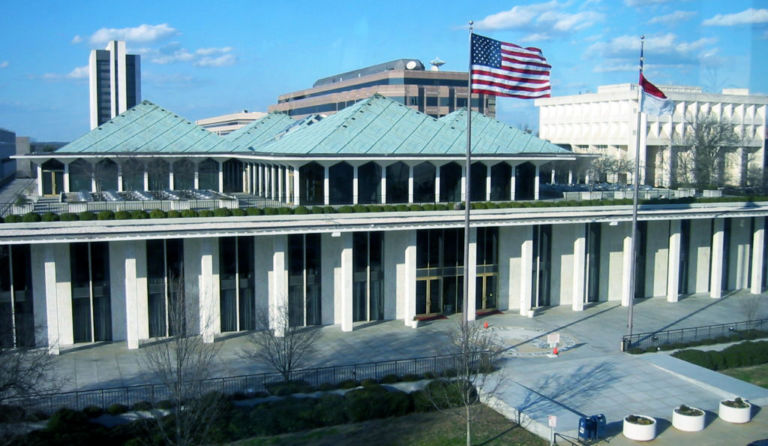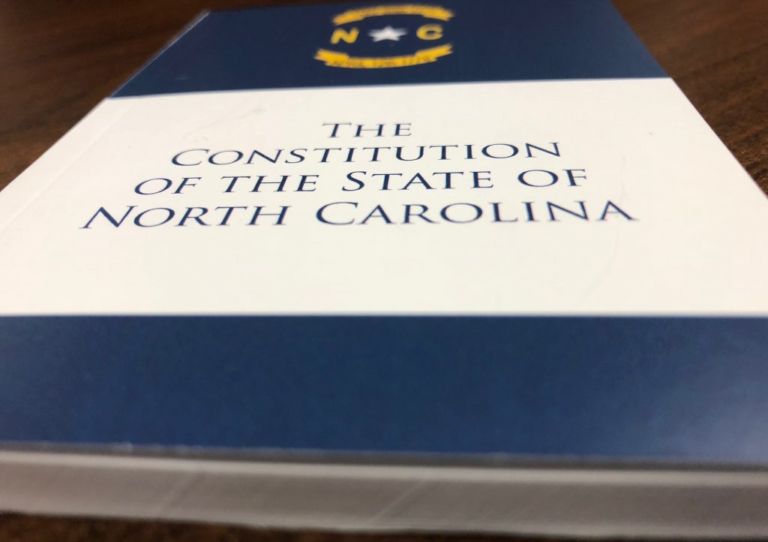The North Carolina Legislature presented the conference report on its masking bill, HB237. While the bill had garnered some controversy over its broad language banning masks, a recent conference report has arguably become more contentious with campaign finance changes inserted into the bill.
The campaign finance changes had not appeared in any other proposed legislation and bypassed the standard legislative committee process by being inserted into the conference report on an unrelated piece of legislation. Because of how these changes were brought forth, many people have speculated on what they will do.
Senate Democrats opted to stage a walkout in protest of the conference report with an immediate press conference making claims on what these new changes mean for this year’s election. While this bill would impact all Federal Political Party Committees (527 Committees) and Super PACs, the heart of this debate centers on the two major political party organizations: the National Governors and Attorney General Associations. Republican leaders described the proposed changes as “needed to be done as a way to level the playing field in terms of money.”
In the early months of 2020, the North Carolina State Board of Elections answered an inquiry posed by the Democratic Governors Association (DGA) regarding what types of federal committees could contribute to state political parties. The state board of elections determined that both Super PACs that accept “unlimited individual contributions” and those that accept funds from impermissible sources could not contribute to state parties directly.
While the DGA does have a traditional Super PAC that accepts corporate contributions, they also maintain a regular PAC (Democratic Action) as the vehicle to move money into the state Democratic party. Regular PACs are subject to individual contribution limits and are ineligible to receive corporate or labor union funding. The Republican Governors Association (RGA) lacks a regular PAC, with funding for the 2016 governor’s race coming directly through its super PAC (RGA Right Direction PAC) to the Republican party.
While both Republicans and Democrats had a vehicle to move federal PAC funds into their respective political parties in 2016, under the rules set out in the 2020 State Board of Elections memo, the RGA would be unable to do so in the 2020 election without setting up a regular PAC like the DGA had been utilizing. In this time frame, the DGA, through their regular PAC, the Democratic Action Committee, increased their funding for North Carolina Democrats from just over $2 million in 2016 to a staggering $9.9 million in 2020 through the then-newly established Democratic Leadership Committee.
Due to the structure of their committee, the RGA was limited to Independent Expenditures (IEs) during the 2020 election. The RGA Right Direction PAC spent nearly $3.7 million in IEs during the 2020 election, with an additional $3.65 million in IE’s coming from the Republican Governors association directly. This left Republicans outspent by over $2.5 million in raw dollars when compared to their Democratic counterpart. This gap becomes worse when considering that IEs do not get discounted rates on media buys. Candidate and political party committees receive a lower rate than others when it comes to running ads through radio, TV, or other mediums.
While the battle of funding between the RGA and DGA in North Carolina has recently gained the attention of many, these types of fights appear to have been going on for at least two decades. In July 2004, the legislature modified election law preventing 527 organizations from spending corporate funds advocating directly 60 days prior to the general election. This legislation was used to block ads from the RGA promoting Republican candidate Patrick Ballantine. The RGA was fined $200,000 and was forced to remove the ad by the board of elections by a 3-2 vote along partisan lines. This ruling and fine was later overturned by the courts.
Though it is important to understand the history of the issue and what caused the debate, it is equally as important to understand what changes are being made to the bill.
What Does HB237 Change for Campaign Finances?
As stated earlier in this article, the bill does not modify contribution limits. Individual candidates may only accept $6,400 from a given source apart from political parties or affiliate organizations. This affects only federal committees, whether they be 527 political party committees or Federal level PACs.
Both 527 committees and Super PACs will be able to contribute to political parties so long as corporate, union, and other funding sources barred from contributing outside of IEs are held in a separate account. If any of these banned sources are used, it would still be considered a class 2 misdemeanor under current state law.
These organizations will still be subject to donor disclosure through the FEC or IRS, but they will no longer have to create and submit new reports to the North Carolina State Board of Elections. Under this change, they would send a copy of their federal expenditure reports from the FEC or their IRS 8872s to the State Board of Elections. Under current law, federal committees do not show their donors on the State Board of Elections website; that information can only be found on the FEC website. Federal committees only report their expenditures within the state or funding they provide to state-level committees. There will be an increase in reports from FEC committees to the SBE due to the Reporting Schedule for the committees impacted by the bill being monthly, rather than quarterly.
Contributors to federal-level committees cannot earmark funds for North Carolina political parties or affiliate committees. State law currently prohibits contributions in the name of another person. State lobbying organizations cannot, therefore, circumvent state contribution restrictions by simply contributing to federal-level committees and then passing the funds on to the state political parties, as some have claimed.
State lobbying organizations and lobbyist donation restrictions are still maintained under this bill; this is not the case for federal PACs. Because federal political committees are no longer defined as “political committees” in the statute, they are detached from the definition of a limited contributor. Therefore, Federal PACs could give donations to candidate committees during legislative sessions. These donations would be subject to contribution limits, and federal political committees would still be prevented from earmarking donations to candidates through party committees, however.
This loophole for Federal PACs to give money to legislators should be addressed by the General Assembly.
While the bill allows a new vehicle in which large contributors may inject substantial funding into the North Carolina election, they already can do so through the state’s political parties and their affiliated committees.
Political parties are already allowed to accept unlimited contributions from individuals; it’s why out-of-state millionaires like Mike Bloomberg were able to contribute $1 million directly to the state Democratic Party in 2020.
Earmarking funds is illegal under current state law, and all organizations the bill affects must disclose their donations either through the SBE, FEC, or IRS. Large-dollar donors do have ways to hide their donations already if they wish to, whether it be through state parties or transferring them to candidate committees or affiliated committees. This, however, would be considered earmarking funds. Therefore, despite the many assumptions made about the bill, it is limited to the changes this would have on individuals. However, the changes to how federal money will move in elections would be changed significantly. Most of these impacts seem highly targeted at the Governors Associations and Attorney General Associations of each party but do impact other Federal “Independent Expenditure only” organizations.
When it comes to “leveling the playing field” this bill would do so in results of funding; structurally both parties already have an even playing field. This bill would allow the RGA’s Super PAC to contribute like it had done prior to the 2020 memo, making it possible for them to match the investment from the DGA’s limited individual committee. However, the RGA could have created a Federal limited contribution PAC and been allowed to provide funding directly just as the DGA can under current law.
A full breakdown of the impacts of the bill was quickly and accurately completed by the State Board of Elections following the Senate’s presentation of the conference report.


